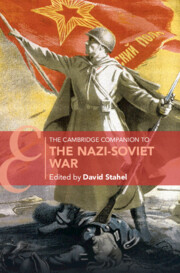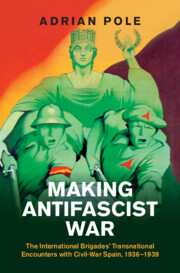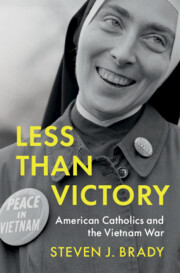Refine search
Actions for selected content:
15366 results in Military history

Waging Peace
- A History of the Vietnam Antiwar Movement
-
- Published online:
- 03 November 2025
- Print publication:
- 13 November 2025

The Cambridge Companion to the Nazi-Soviet War
- Coming soon
-
- Expected online publication date:
- November 2025
- Print publication:
- 20 November 2025
-
- Book
- Export citation

Hunger Redraws the Map
- Food, State, and Society in the Era of the First World War
-
- Published online:
- 01 November 2025
- Print publication:
- 20 November 2025

Making Antifascist War
- The International Brigades' Transnational Encounters with Civil-War Spain, 1936–1939
-
- Published online:
- 28 October 2025
- Print publication:
- 14 August 2025

Less Than Victory
- American Catholics and the Vietnam War
-
- Published online:
- 16 October 2025
- Print publication:
- 11 September 2025
1 - Combatants without Borders
-
- Book:
- Armed Internationalists
- Published online:
- 19 September 2025
- Print publication:
- 09 October 2025, pp 1-18
-
- Chapter
- Export citation
Copyright page
-
- Book:
- Armed Internationalists
- Published online:
- 19 September 2025
- Print publication:
- 09 October 2025, pp iv-iv
-
- Chapter
- Export citation
Contents
-
- Book:
- Armed Internationalists
- Published online:
- 19 September 2025
- Print publication:
- 09 October 2025, pp v-vi
-
- Chapter
- Export citation
2 - The Battalion of Seamen
-
- Book:
- Armed Internationalists
- Published online:
- 19 September 2025
- Print publication:
- 09 October 2025, pp 19-58
-
- Chapter
- Export citation
Acknowledgements
-
- Book:
- Armed Internationalists
- Published online:
- 19 September 2025
- Print publication:
- 09 October 2025, pp vii-x
-
- Chapter
- Export citation
3 - The Making of a Global Warrior
-
- Book:
- Armed Internationalists
- Published online:
- 19 September 2025
- Print publication:
- 09 October 2025, pp 59-96
-
- Chapter
- Export citation
Sources and Bibliography
-
- Book:
- Armed Internationalists
- Published online:
- 19 September 2025
- Print publication:
- 09 October 2025, pp 261-279
-
- Chapter
- Export citation
Notes
-
- Book:
- Armed Internationalists
- Published online:
- 19 September 2025
- Print publication:
- 09 October 2025, pp 280-280
-
- Chapter
- Export citation
Index
-
- Book:
- Armed Internationalists
- Published online:
- 19 September 2025
- Print publication:
- 09 October 2025, pp 281-288
-
- Chapter
- Export citation
7 - Armed Internationalism (1936–1979)
-
- Book:
- Armed Internationalists
- Published online:
- 19 September 2025
- Print publication:
- 09 October 2025, pp 238-260
-
- Chapter
- Export citation
5 - Revolutionaries in Search of a Revolution
-
- Book:
- Armed Internationalists
- Published online:
- 19 September 2025
- Print publication:
- 09 October 2025, pp 137-197
-
- Chapter
- Export citation
6 - Araceli’s Sisters in Arms
-
- Book:
- Armed Internationalists
- Published online:
- 19 September 2025
- Print publication:
- 09 October 2025, pp 198-237
-
- Chapter
- Export citation
4 - Asian Outcasts
-
- Book:
- Armed Internationalists
- Published online:
- 19 September 2025
- Print publication:
- 09 October 2025, pp 97-136
-
- Chapter
- Export citation
Abbreviations
-
- Book:
- Armed Internationalists
- Published online:
- 19 September 2025
- Print publication:
- 09 October 2025, pp xi-xii
-
- Chapter
- Export citation
Contents
-
- Book:
- Armed Citizens and Citizens in Arms
- Published online:
- 12 September 2025
- Print publication:
- 25 September 2025, pp vii-vii
-
- Chapter
- Export citation
